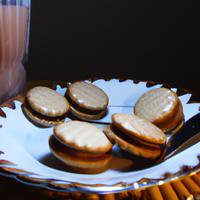
1 serving (30 grams) contains 140 calories, 1.0 grams of protein, 6.0 grams of fat, and 20.0 grams of carbohydrates.

Log this food in SnapCalorie

Nutrition Information
Calories |
1120.0 | ||
|---|---|---|---|
% Daily Value* |
|||
| Total Fat | 48 g | 61% | |
| Saturated Fat | 24 g | 120% | |
| Polyunsaturated Fat | 0 g | ||
| Cholesterol | 0 mg | 0% | |
| Sodium | 560.0 mg | 24% | |
| Total Carbohydrates | 160.0 g | 58% | |
| Dietary Fiber | 4.0 g | 14% | |
| Sugars | 64.0 g | ||
| protein | 8.0 g | 16% | |
| Vitamin D | 0 mcg | 0% | |
| Calcium | 80.0 mg | 6% | |
| Iron | 4.0 mg | 22% | |
| Potassium | 160.0 mg | 3% | |
* Percent Daily Values are based on a 2,000 calorie diet. Your daily values may be higher or lower depending on your calorie needs.
Food Attributes
Source of Calories
About Tennis biscuits
Tennis Biscuits are a classic South African treat, widely enjoyed for their sweet, crumbly texture and coconut-infused flavor. These rectangular biscuits, made with wheat flour, sugar, vegetable oil, and desiccated coconut, are a staple in many desserts, including fridge cakes and tarts. Originating from the heritage of British-style tea biscuits, they’ve become a beloved item in South African cuisine. While Tennis Biscuits provide quick energy due to their carbohydrate content, they are high in sugar and refined grains, lacking substantial nutrients or fiber. As such, they’re best consumed in moderation or balanced with nutrient-dense foods when featured in recipes. Their versatility makes them a popular choice in desserts requiring no baking, adding sweetness and structure to layered dishes. While not a health food, Tennis Biscuits remain a cherished indulgence tied closely to many traditional South African family recipes and gatherings.



